[Argus Press Software, BBC Micro]
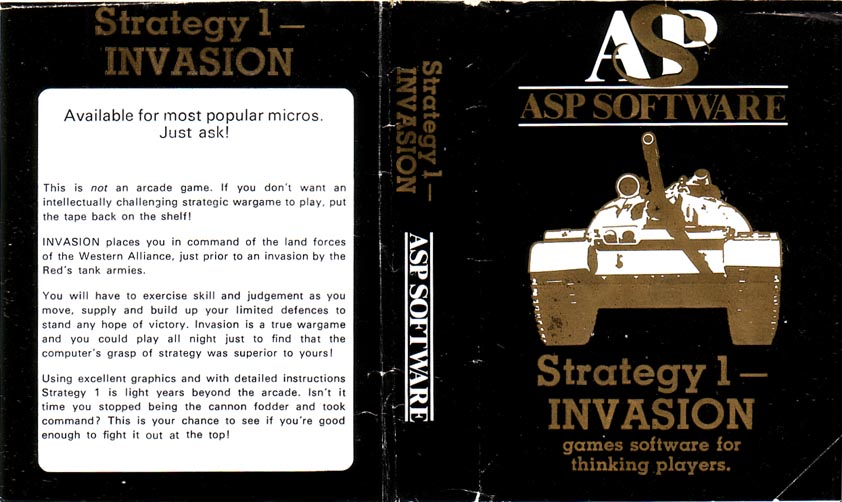
Lieutenant Narwhal ! The Reds are attacking with overwhelming forces. What are you going to do ?
Let them pass ! I will just snatch the cities back from them after they’ve passed !
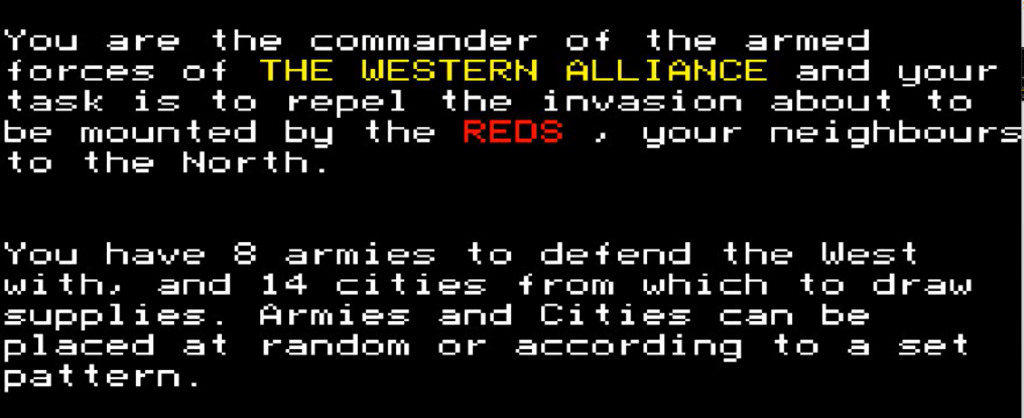
Well, it looks like we are getting invaded in this Invasion game, not the other way around !
The game begins with my 8 armies, each with a starting strength of 10, positioned in the North of the map, with armies #2 and #3 overlapping 2 of my 14 cities.
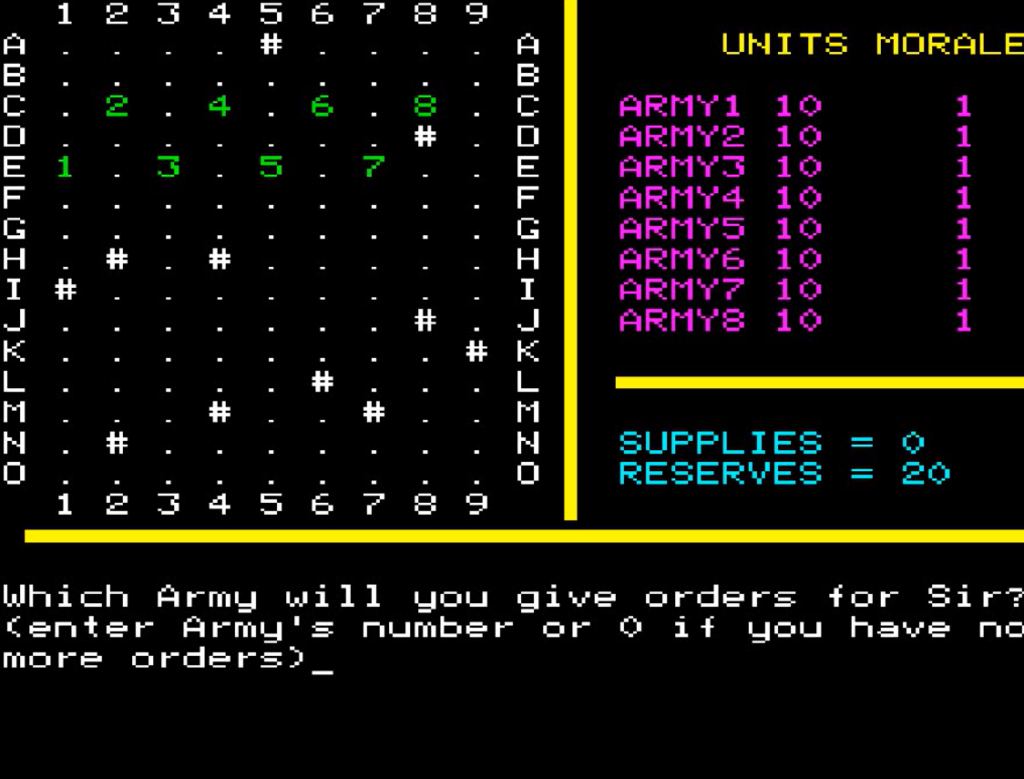
During each turn, I can choose one of the following actions for each of my eight armies:
- Move it (up to 2 squares),
- Strengthen it by allocating any number of strength points from reserve (no maximum strength),
- Deplete it by sending some of their strength points back to the reserve. It can be used by another army the same turn.
After performing an action, I can attack a neighboring enemy by spending one supply per strength point used. Of course, at the moment, there are no enemies on the map.
My objective is to defend my cities and prevent the enemy from crossing the map. I consider the city at A5 (Hamburg?) indefensible and decide to trade territory for time by falling back, only reinforcing my second army to defend the city it currently occupies.
As expected, during their turn, the Reds spawn right on A5, immediately capturing the city :

After the AI’s turn, I allocate my “resource points” (10 per city I control) between reserves (for strengthening) and supplies (for attacking). I prioritize building up enough supply for at least one counter-attack and mostly purchase the more expensive supplies :
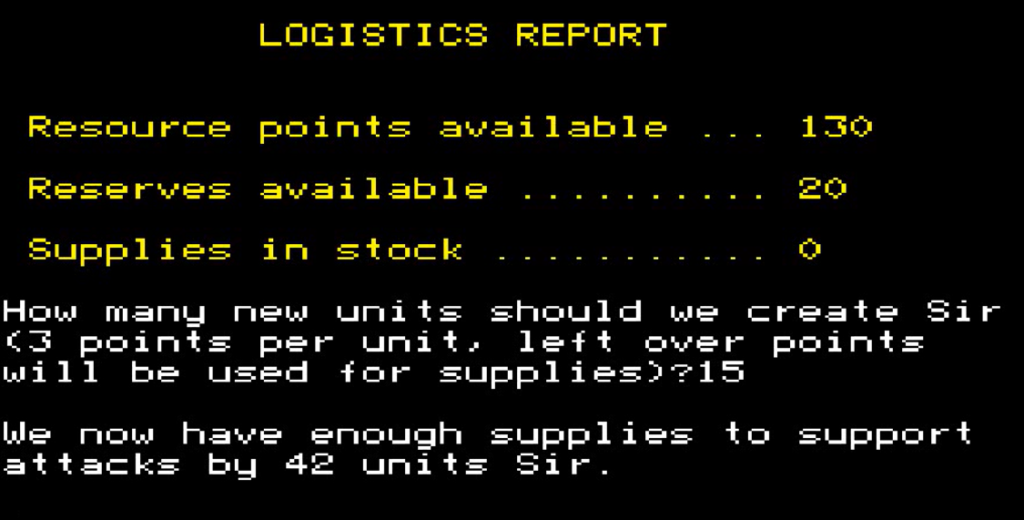
I allocate all my reserves to my second army again, boosting its strength to 45 ! Bring it on !
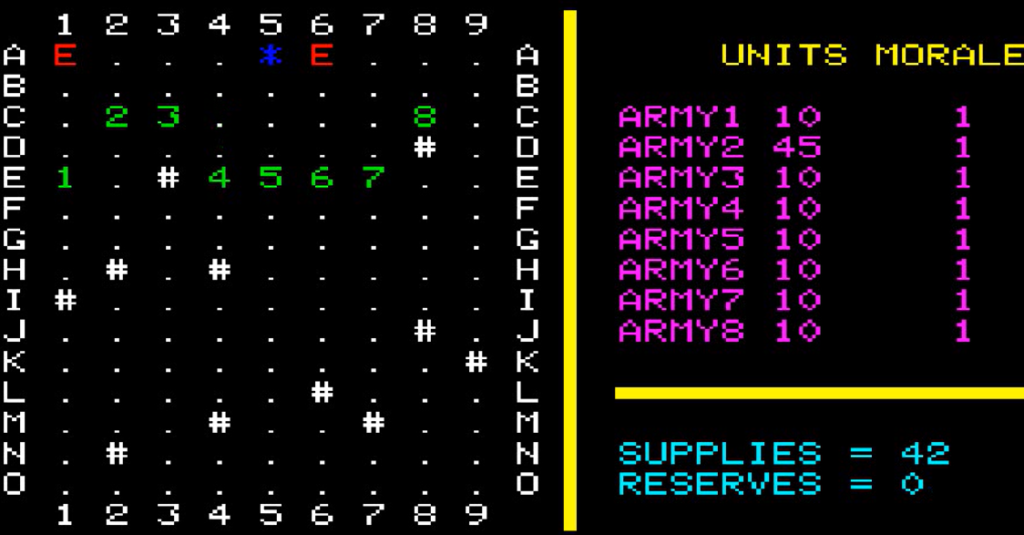
Alas, despite holding a strong defensive position, this army gets badly battered during the enemy’s turn, which I barely dent. Sad.

A defeated unit loses morale, hindering its combat effectiveness. I decide to move my demoralized army out of reach by heading north. In Invasion, Red armies can only move to the three squares directly south of them, making adjacent left and right squares weirdly safe !
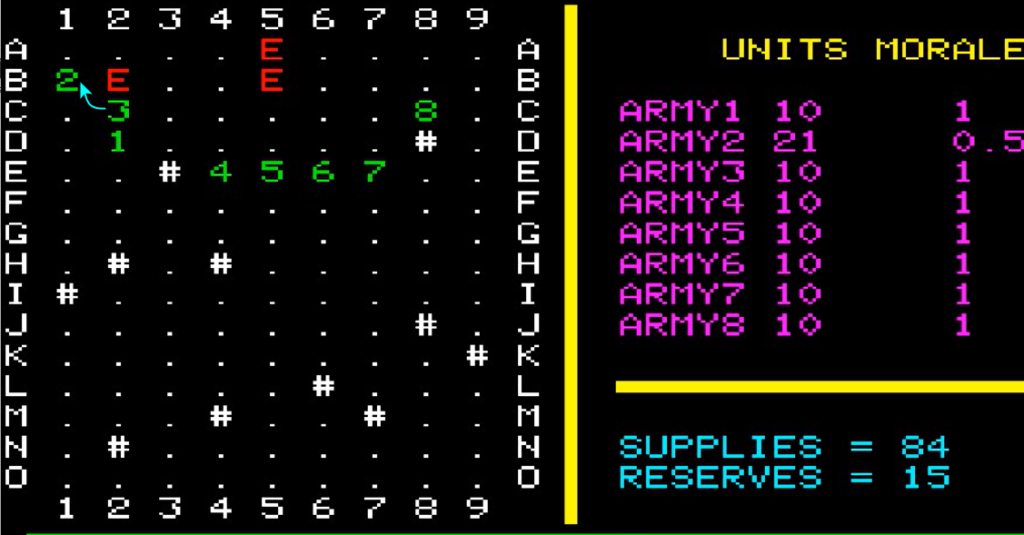
City C2 is now defended by my Third Army, which has not received reserve allocations. I hope for the best… and achieve victory!

The third army clings to the city by a thread, left with only one strength point! I use all my resources to prepare reserves, fully allocating them to the Third Army. Time to counter-attack, using a combination of my third army (55 points strong) and my second army (21 points strong, fighting at half-strength due to morale).
It fails spectacularly, only destroying one enemy strength point (out of 45), at the cost of 7 of mine :
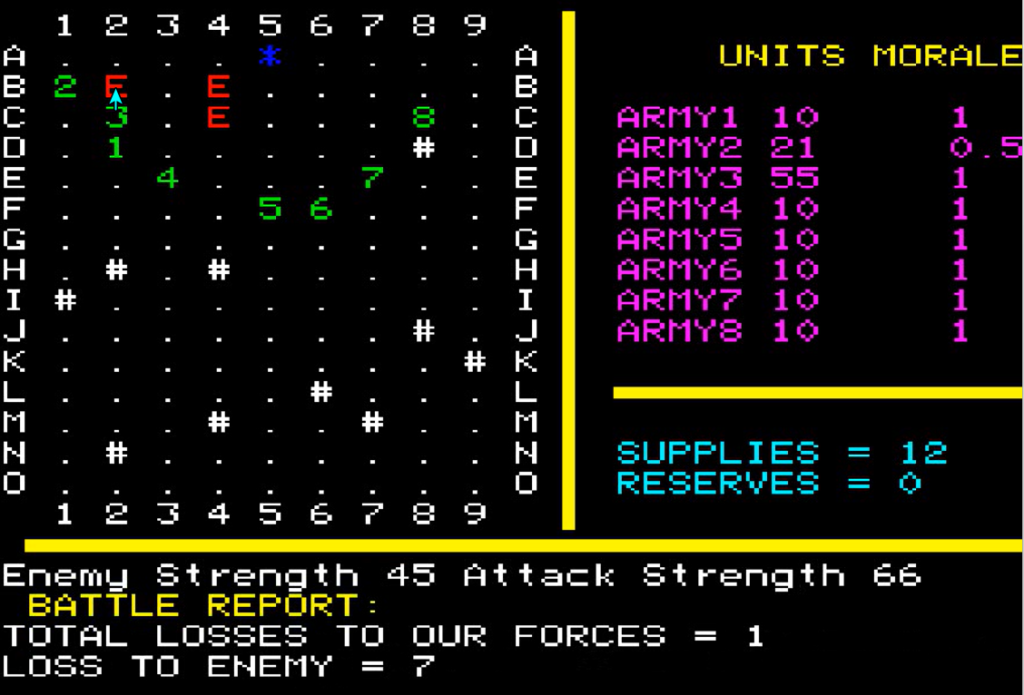
The following turn, the enemy armies wipe out my second army fully ! I also lose the 4th army which was defending a city further South :
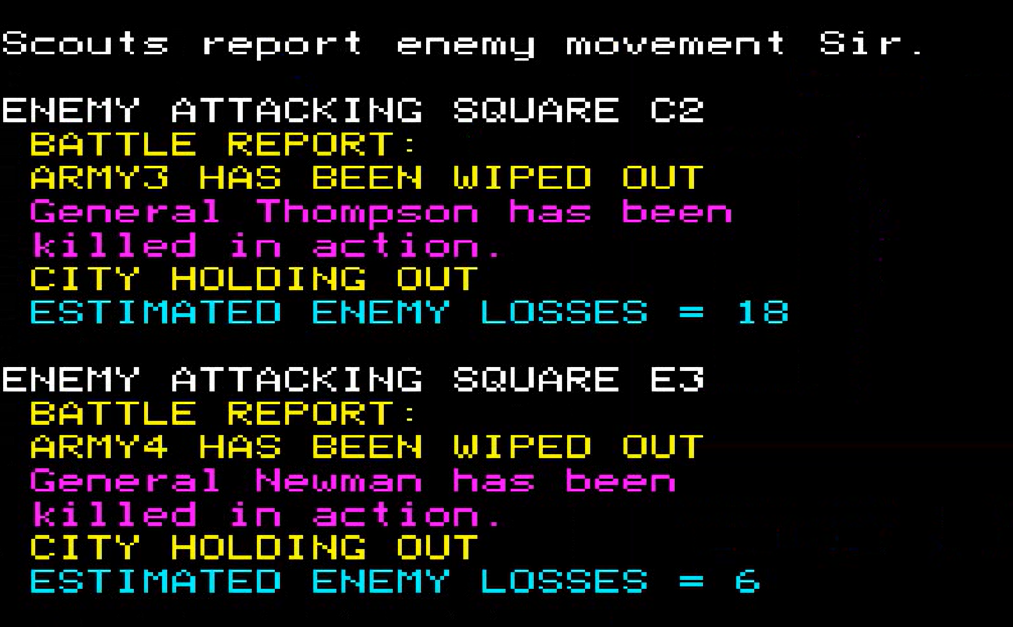
Miraculously, the cities held, but I know they will fall next turn. My first and sixth armies retreat to defend the two cities in line H. With no new enemy forces approaching from the north, I send my fifth army to recapture city A5, transferring strength points from other armies. The city is easily retaken, boosting my fifth army’s morale :
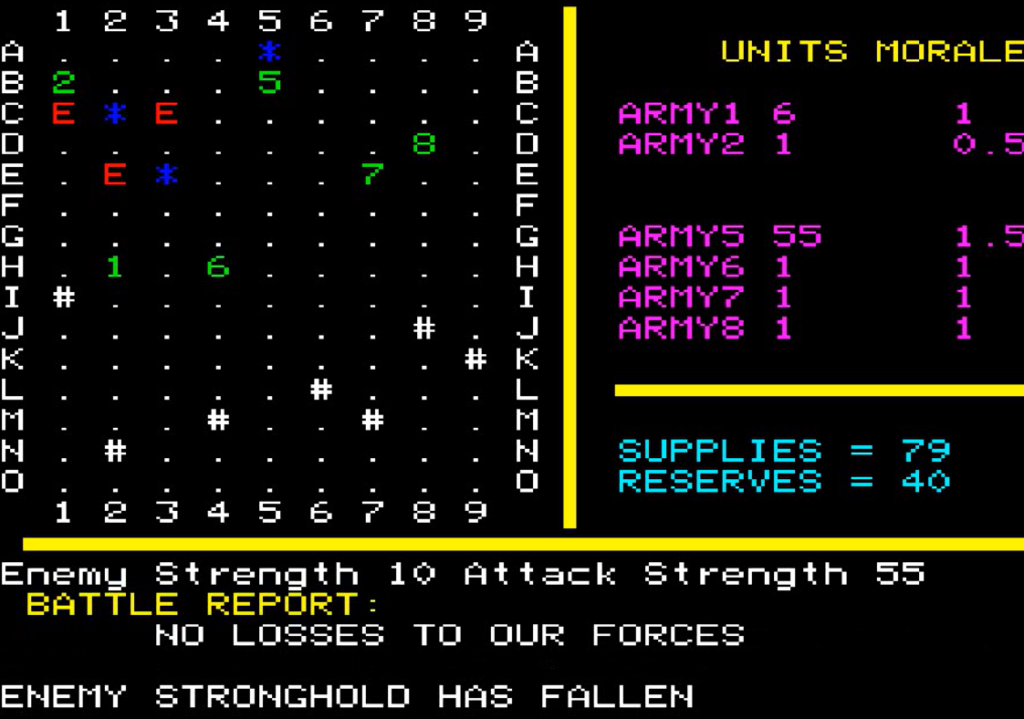
As the enemy moves west, I send all my reserves to my first army defending city H2. An initial victory raises its morale to 1.5, making future victories more likely. In the back, my fifth army seizes city C2 :
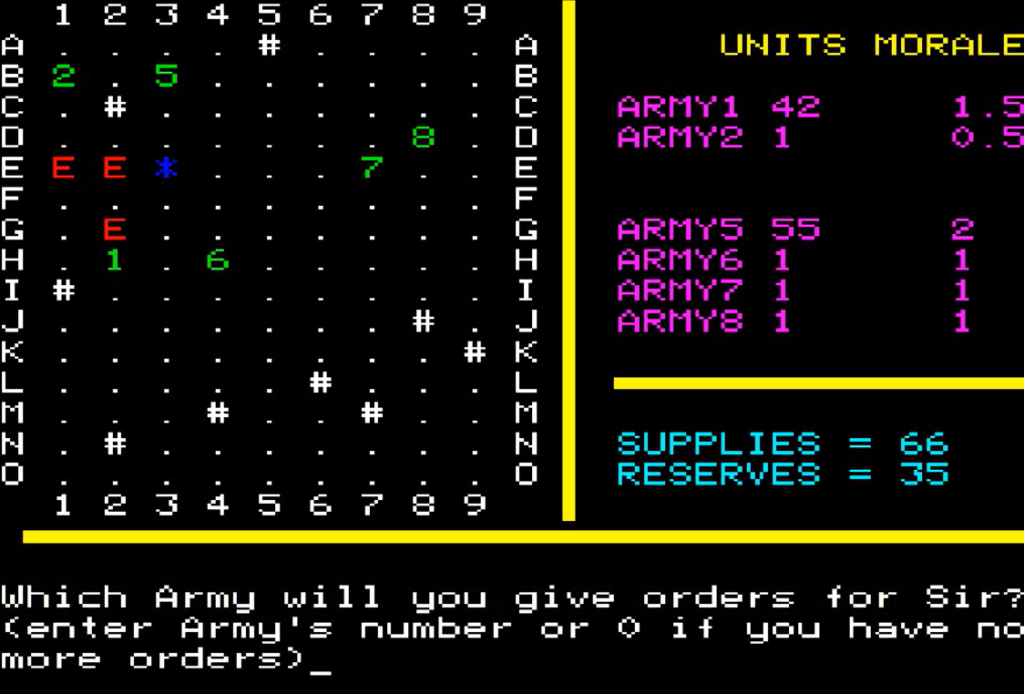
My determined fifth army attacks the enemy force lingering in E2. Unlike the army assaulting H2, this Red army does not receive constant reinforcements. It is quickly wiped out. Meanwhile, my first army continues to receive reinforcements and win battles :
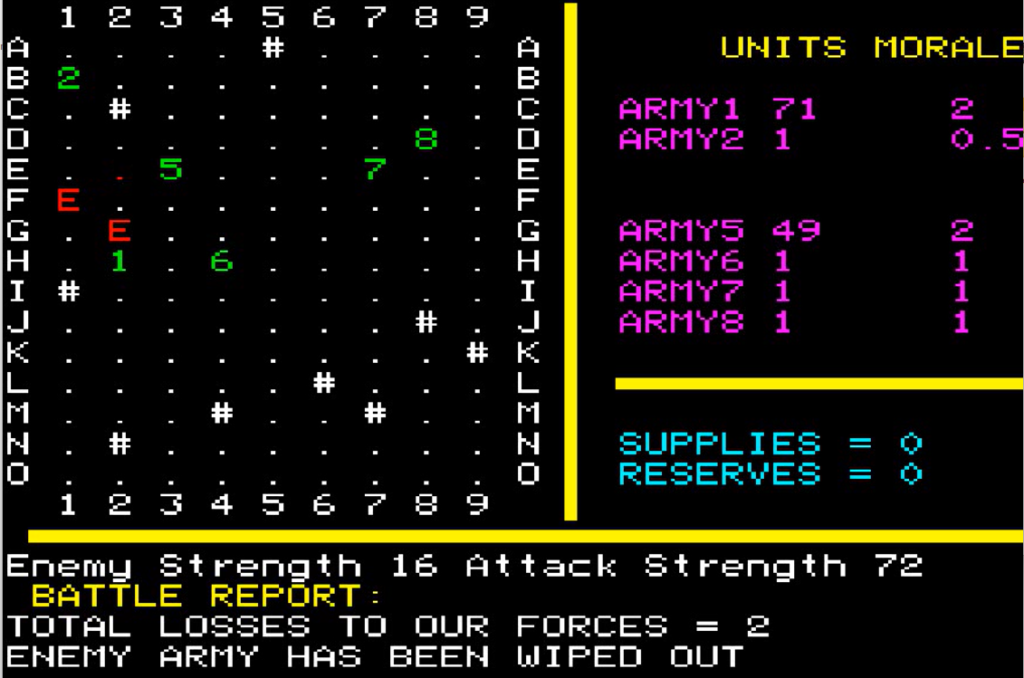
Alas, the game considers that the Reds should always have 3 armies. A new one spawns at A5, taking the city again.
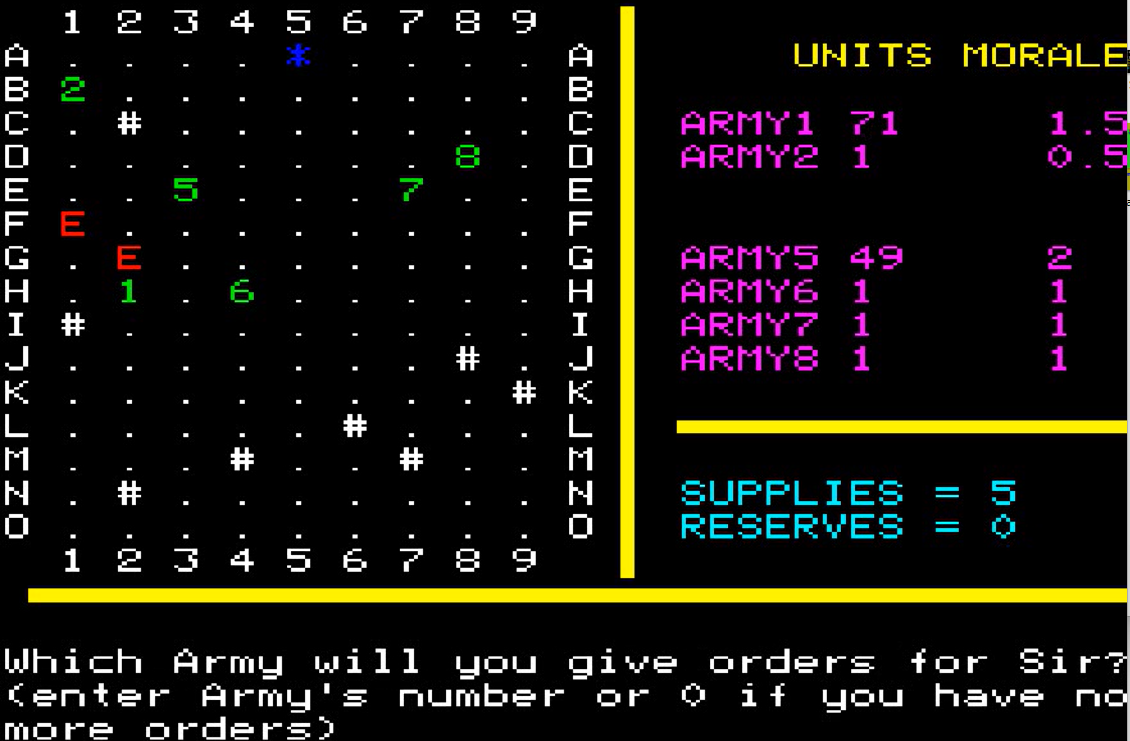
A few turns later, while my first army is still holding H2, my fifth army recaptures the northern city once more and launches an indecisive attack against the last Red army.
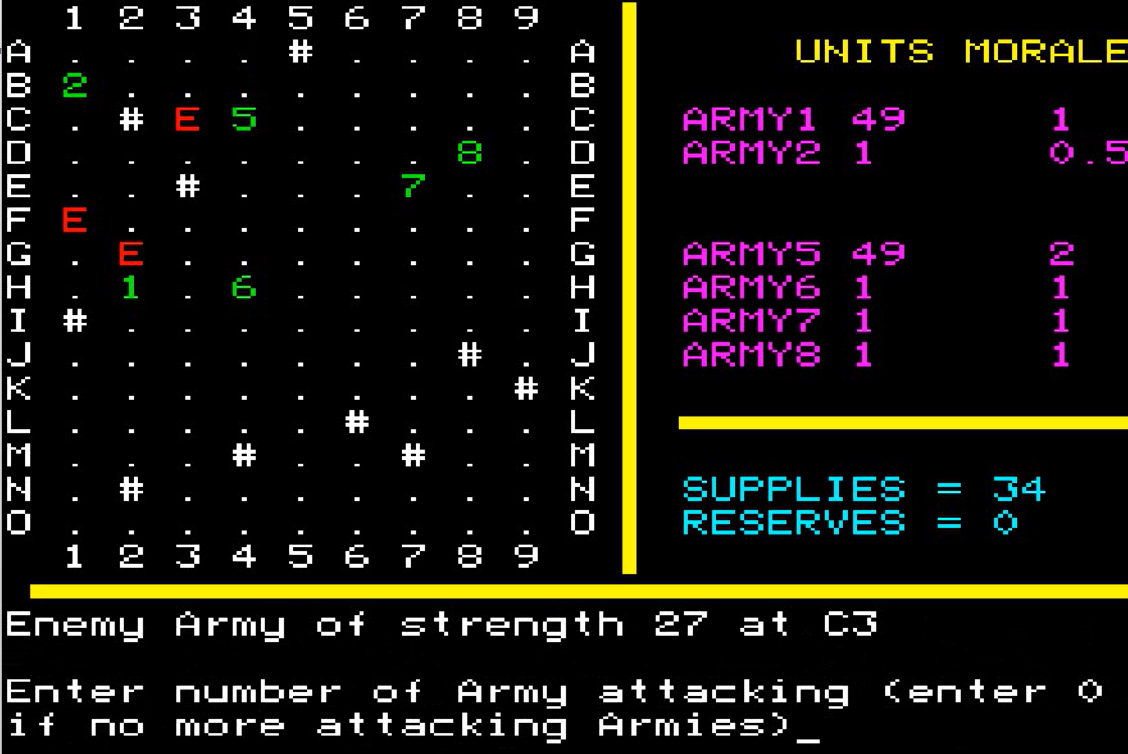
That’s when the game ends. After so many losses, the Reds sue for peace :
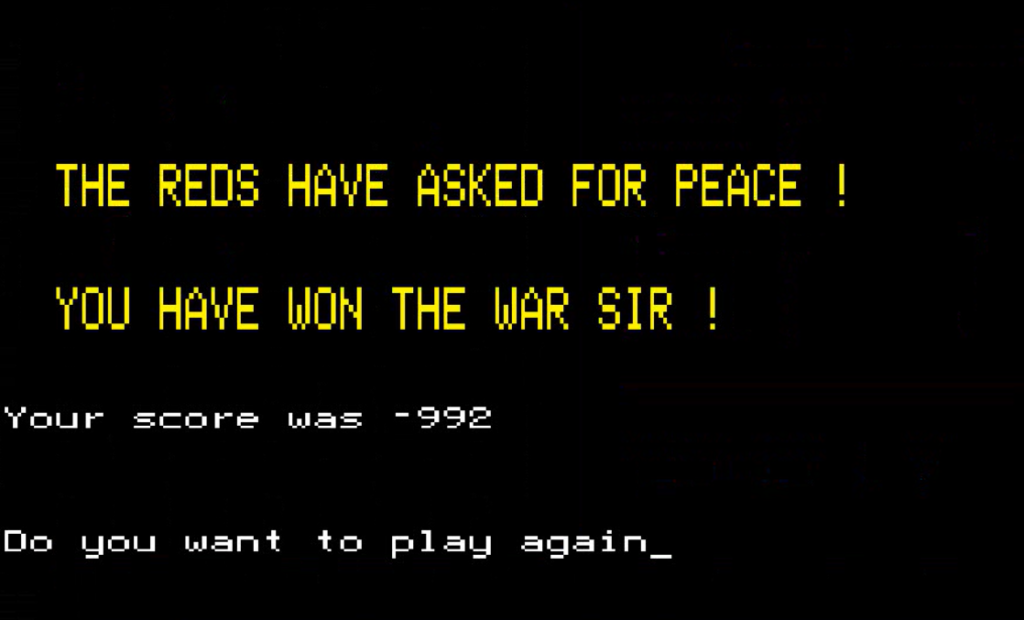
I’ve experienced more satisfying victories and more engaging games.
Rating and Reviews
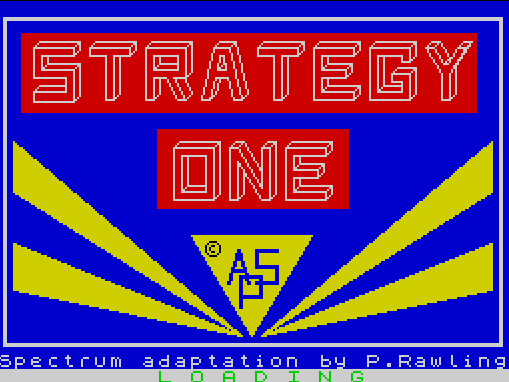
Strategy One – Invasion by Argus Press Software (then APS Software), UK
First release : October 1983 (multiplatform)
Tested on : BBC Micro emulator (Pantheon)
Total time tested : One hour and a half.
Average duration of a campaign: 20 minutes
Complexity: Low (1/5)
Would recommend to a modern player : No
Would recommend to a designer : No
Final Rating: Totally obsolete
Ranking at the time of review : 82/94
Summary :
On paper, Argus Press Software’s first strategy game, Strategy One – Invasion, has a design that seems suitable for short sessions. However, in practice, its unintelligible and highly random combat outcome combined with a braindead AI ruins the game.
Strategy 1 – Invasion is the inaugural wargame by Argus Specialist Publication Software, a division of Argus Press. Established before World War I, Argus Press was an established publishing company that, by the early 80s, boasted a diverse portfolio of publications, including newspapers, lifestyle magazines, professional journals, and hobby and niche interest magazines (think modeling or woodworking) under their Argus Specialist Publication (ASP) division.
ASP seem to have missed the beginning of computing, but when British computing exploded under the joint influence of Clive Sinclair and the BBC Micro, they quickly caught up. They acquired Computing Today in either 1979 or 1980 and launched influential magazines like Your Computer (1981), ZX Computing (1982), Personal Software (1982) or Home Computing Weekly (1983). Magazines on computers in the early 80s of course had to have type-in code, so by owning those magazines ASP became a game publisher of sorts. From there it was an easy step for ASP to sell the cassettes of some of those listed games directly by mail-order through ads in the magazines it owned. Under the name ASP Software, it started selling in December 1982 “The Valley” (a RPG first found in 1981 as a type-in in Computing Today) and then early 1983 four more games which had also been listed in 1980 or 1981 in ASP magazines: The White Barrows, Conquering Everest, Cells and Serpents and Stockmarket.
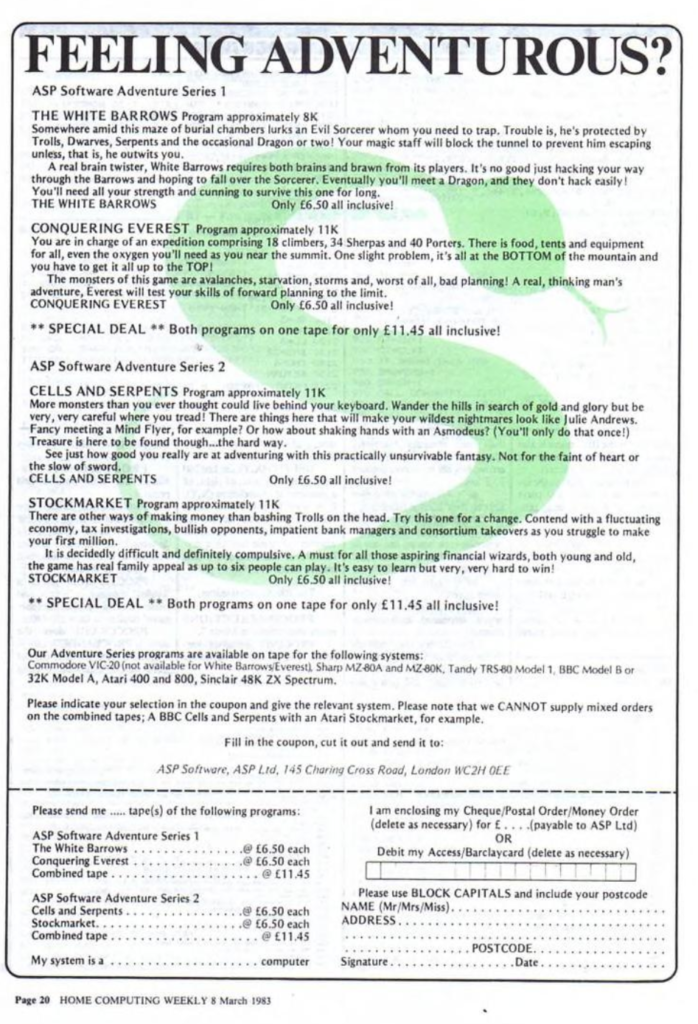
Naturally, there was a limited supply of type-in games that could be sourced from existing magazines and repackaged as cassette games. Additionally, as public expectations for quality increased, ASP decided to take the final step : developing their own games. The first batch arrived in October 1983 (according to the ads), featuring two strategy games: Strategy 1: Invasion and Strategy 2: Bismark.
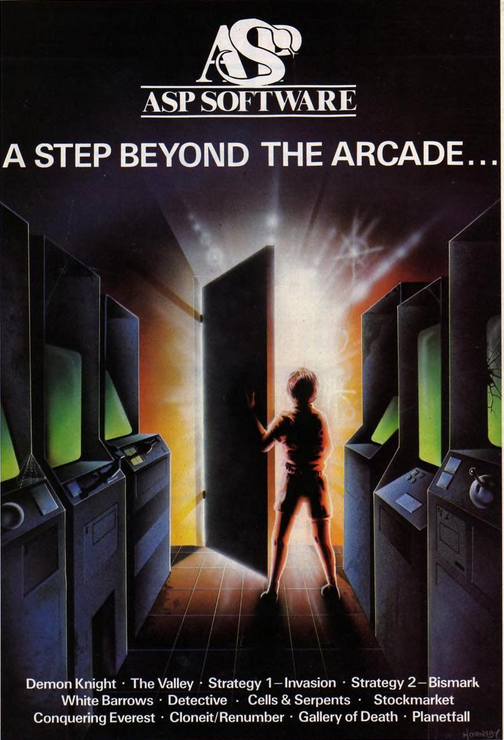
And now, the review :
A. Immersion : Terrible. The ZX Spectrum version is better looking (“very poor“). My AAR was going to be on it but alas an incorrect input crashed the game.
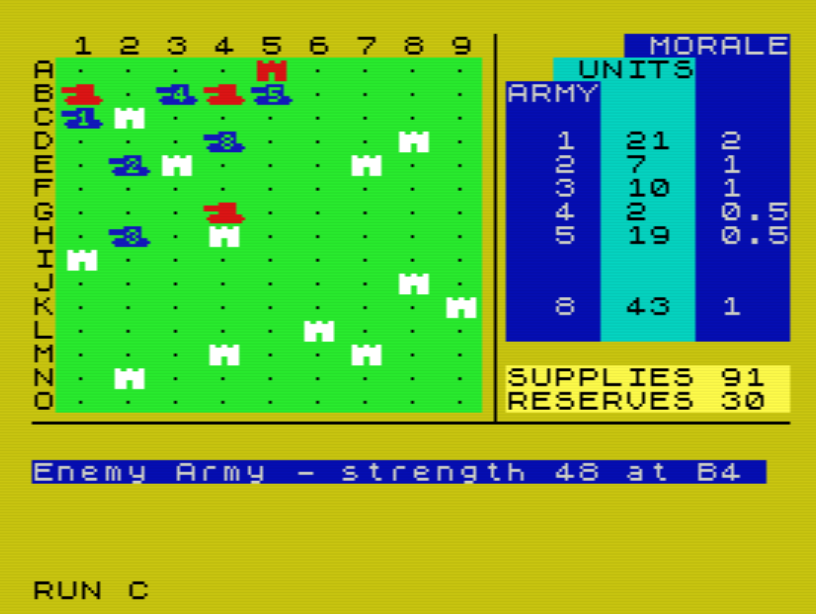
B. UI, Clarity of rules and outcome : Very poor. There are numerous minor issues, but two major ones stand out :
- The standard deviation in battle results is off-the-chart. I don’t understand why one battle ends with one strength point loss on my side and 25 on the other side, and another with comparable forces leads to a loss of 40 strength points on my side and 2 on the other side.
- The game ends unexpectedly when you have caused so much damage that the Reds sue for peace, but you have no counter of any sort, so you don’t have any sense of progression in the game.
C. Systems : Very poor. I like having to allocate “production points” coming from cities between two important resources, as it is a simple feature that creates three interconnected decisions : resource allocation, whether to abandon cities when they are threatened and where/when to counter-attack.
I disliked everything else in the game.
D. Scenario design & balancing : Terrible. The game offers 5 levels of difficulty (I played at difficulty 3 and tested a bit more at difficult 4) and randomisation of the starting position of the armies and cities. The AI is stupid (the game’s words in the tutorial, not mine) : it can only move South (so it can’t defend its cities) but it does not try to race for the bottom of the map either and just headbutts every turn against whatever solid army you manage to muster in front of it.
E. Did I make interesting decisions ? No. I thought I did initially, but the impact of the RNG is so huge that decisions feel irrelevant.
F. Final rating : Totally obsolete. Invasion has one solid concept (the resource / supply allocation) but the lack of immersion, the stupidity of the AI and the wild combat results make this game actively frustrating to play.
Contemporary Review
Spectrum Computing found 3 reviews for the game and I did not find any other :
- Two reviewers found the game mediocre (ZX User, July 1987 gives it 60% playability in July 1987 while Your Computer states “the choices and strategies open to you seem somewhat limited and once the right mix of [resource and supply] has been discovered, I doubt the game has that much more to offer“)
- One hated it (Crash, October 1984 : “an exercise in headbanging“.
It turns out I agree with the British magazines more than with the American ones.
Don’t worry for ASP. Their strategy paid off, probably not thanks to Invasion of course. ASP Software was successful enough that in 1984 it was split from ASP and was renamed Argus Press Software. It later became the publisher among others of Lothlorien, so we will see a lot more of them. For now, I will review soon the even shorter Strategy 2 : Bismark. Being currently on holiday, I really appreciate those small games !